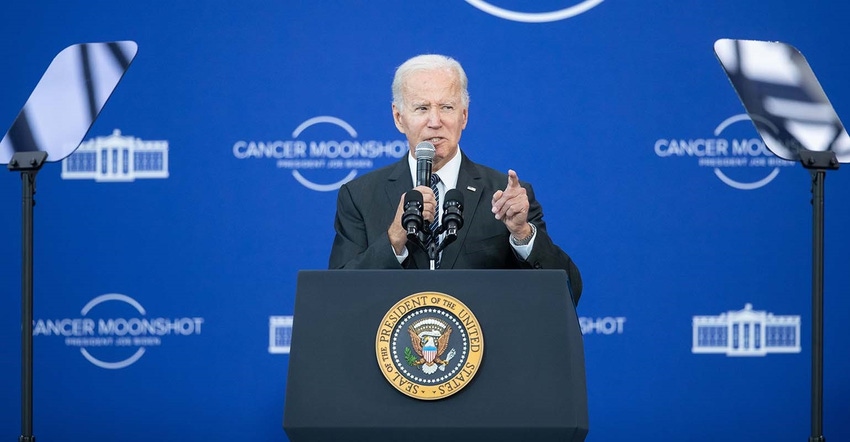Biden announces executive order on bioeconomy
Actions will support improved markets for biobased products, create greater access to biotechnology, and encourage R&D support for bioeconomy.

As part of the discussion around the administration’s new Cancer Moonshot Initiative announced Sept. 12, President Joe Biden signed an executive order that launched a national biotechnology and biomanufacturing initiative which drew praise from those in agriculture.
“Today's action is going to ensure that America leads the world in biotechnology and biomanufacturing, creating jobs, reducing prices, strengthening supply chains so we don't have to rely on anywhere else in the world,” Biden commented while speaking at the John F. Kennedy Presidential Library and Museum in Boston, Mass., on Sept. 12.
On Wednesday, the White House will host a summit on the bioeconomy and biomanufacturing. The Biden administration also said it will announce new investments and resources across a wide range of agencies that will allow the United States to “harness the full potential of biotechnology and biomanufacturing.”
The initiative contains many provisions important to American soybean farmers, including actions that will support improved markets for biobased products, create greater access to biotechnology, and encourage research and development supporting the “bioeconomy,” or economic activity derived from biotechnology and biomanufacturing.
The executive order notes, “Although the power of these technologies is most vivid at the moment in the context of human health, biotechnology and biomanufacturing can also be used to achieve our climate and energy goals, improve food security and sustainability, secure our supply chains, and grow the economy across all of America.”
In a background call with senior White House officials, they explained the new initiative looks “to improve food security and drive agricultural innovation, including through new technologies that protect crops from disease, enhance seeds and fertilizers and foods made with cultured animal cells.”
Also during the media call, the officials note the initiative “will help bring bioproducts to market that will help support American farmers and reduce risk through biosecurity innovation, as well as enhance workforce training and education programs for the next generation of biotechnologists.”
The order calls for USDA, the Food and Drug Administration, and the Environmental Protection Agency to identify areas of "ambiguity, gaps or uncertainties" in the federal regulatory system for biotechnology within 100 days. These agencies are required to submit a plan for implementing reforms, including identifying regulations and guidance documents that need to be "updated, streamlined or clarified."
Praise for biotechnology focus
Dr. Michelle McMurry-Heath, president & CEO of the Biotechnology Innovation Organization, welcomed the directives to strengthen the domestic biotechnology and biomanufacturing industry.
“We commend the administration for launching this initiative, particularly the actions to streamline regulatory regulations for biotechnology products, expand market opportunities for biobased products, work for international alignment of regulatory standards, and invest in training and education pathways to ensure an adequate, diverse biotech workforce,” McMurray-Heath says.
The Ag Bioeconomy Coalition, which includes the American Farm Bureau Federation, American Soybean Association, Corn Refiners Association, Growth Energy, National Association of State Departments of Agriculture, National Corn Growers Association, National Hemp Association and Plant Based Products Council, also expressed appreciation for the focus on growing the U.S. biomanufacturing sector.
“The ag bioeconomy is a vibrant generator of innovation, high-quality jobs in rural communities, and domestic supply chain solutions. It includes the people who grow agricultural feedstocks, businesses that manufacture biobased inputs and products, and the consumers who purchase them. By investing in the U.S. bioeconomy, we can tap the talent and resources of American agriculture and position our country’s farmers and ranchers to lead the shift to a circular economy,” the coalition notes in a joint statement.
ASA President Brad Doyle, a soybean grower from Arkansas, adds, “This announcement puts in place steps that will help the soy industry continue to use soybeans to develop innovative, sustainable products that can help lower greenhouse gas emissions and create more jobs for not only agriculture but all Americans. We are also pleased to see included measures that support agricultural biotechnology regulatory reform, along with quite a few other provisions.”
U.S. companies now offer approximately 1,000 soy biobased products.
ASA appreciated several items called for under the executive order. Among that list of action items welcomed by the soy industry include the following:
• A report from USDA on leveraging the bioeconomy for “improving sustainability and land conservation; increasing food quality and nutrition; increasing and protecting agricultural yields; protecting against plant and animal pests and diseases; and cultivating alternative food sources.”
• The Data for the Bioeconomy Initiative, which will use data to drive breakthroughs in the bioeconomy.
• Various agencies taking steps to expand domestic biomanufacturing and biobased product manufacturing.
• An emphasis on federal agency procurement of biobased products, overseen by USDA.
• A requirement to create a lexicon for the bioeconomy to help measure the size and impact of the bioeconomy, and a focus on making revisions to the North American Industry Classification System and the North American Product Classification System.
• A focus throughout on protecting and enhancing the security of physical infrastructure, biosecurity/biological data, and cyber-security.
• A call for, within 280 days, developing a plan for regulatory reform for the areas requiring clarification or improvement in the federal agricultural biotechnology coordinated framework.
• A requirement that annual reports be developed for three additional years providing progress reports on agricultural biotechnology regulatory modernization efforts.
Those in the cultured meat industry welcomed the "nod" by the administration. Josh Tetrick, cofounder and CEO of Eat Just, says, “America has an opportunity to lead the world in building a new, healthier, and more sustainable approach to making meat. It's critical for our food security, for our manufacturing and technology base, and for our moral leadership. I applaud this week’s bold move by the White House.”
About the Author(s)
You May Also Like




.png?width=300&auto=webp&quality=80&disable=upscale)
